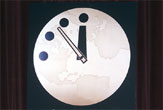
In Dec. of 1945, four months after the United States destroyed the Japanese cities of Hiroshima and Nagasaki with atomic bombs, a group Manhattan Project scientists from the University of Chicago created "The Bulletin of the Atomic Scientists," a magazine devoted to warning the world of the dangers of the weapon they helped unleash.
To honor the 60th anniversary of the Bulletin, the University of Chicago will hold a public panel discussion this Saturday, Dec. 3 on "Avoiding Doomsday in the Contemporary World."
The event will be followed by a screening of Stanley Kubrick's 1964 film, "Dr. Strangelove or: How I Learned to Stop Worrying and Love the Bomb."
Doomsday Clock
In 1947, the Bulletin's Board of Directors came up with the idea of using a Doomsday Clock to symbolize the threat posed by nuclear weapons. The message is that humans are "a few minutes to midnight" where midnight represents destruction by nuclear war.
The hands of the clock move in response to changing world events, marching forward or back depending on the state of the world and the prospects of nuclear war.
The Bulletin still makes its home on the University of Chicago campus and has since expanded its focus to include not only information about the dangers of nuclear weapons, but also on other international security issues, the arms trade and the nuclear industry in general.
Sign up for the Live Science daily newsletter now
Get the world’s most fascinating discoveries delivered straight to your inbox.
The Doomsday Clock debuted in 1947 during the Cold War between the United States and Soviet Union with the time showing seven minutes to midnight. The time has since changed 17 times.
The closest approach to Doomsday occurred in 1953, when the clock was changed to two minutes to midnight after the United States and the Soviet Union each tested thermonuclear devices within nine months of one another.
Today the clock is once again set to seven minutes to midnight. It was moved up from nine minutes to midnight in 2002. According to the Bulletin's Board of Directors, the change reflects recent events that are hindering global nuclear disarmament.
Among the things that the Board believes are worrisome is the United State's abandonment of the Anti-Ballistic Missile (ABM) Treaty, the continuing nuclear arms race between India and Pakistan and the declared intention by terrorists to acquire and use nuclear and biological weapons.
60th anniversary events
Panelists for this Saturday's discussion will include physics Nobel Laureate James Cronin and economics professor George Stigler, both of whom are from the University of Chicago. The discussion will be moderated by Thomas Rosenbaum, the University of Chicago's Vice President for Research and for the Argonne National Laboratory.
Following the forum discussion will be a screening of "Dr. Strangeglove," a film about a doomsday device that is accidentally detonated.
The panel discussion will run from 1 to 3:30 pm and the film screening will begin at 4 pm. Reservations for both events can be made by e-mailing events@thebulletin.org or by calling (773) 834-9988.










